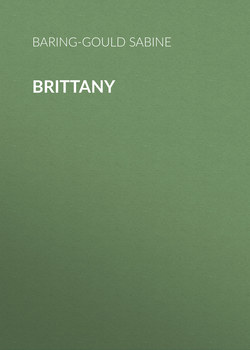Читать книгу Brittany - Baring-Gould Sabine, Baring-Gould Sabine - Страница 1
PREFACE
ОглавлениеBrittany can hardly claim the attention of the tourist as a superlatively beautiful country. The way in which trees are clipped and tortured out of shape disfigures the sylvan landscape; and of mountain scenery there is none. The ranges of the Montaignes Noires and the Monts d'Arrez are insignificant. Yet the valleys are pretty, but never grand. The charm of Brittany is to be found in the people and in the churches. The former with their peculiar costumes, and their customs are full of interest, and the latter are of remarkable beauty and quaintness. The ordinary tourist will hardly see much of the costume unless he attends a pardon, the Patron of the Irish peasant; the patronal feast at some chapel frequented only on the day of the pardon. But the student of men and manners will find much to interest him at such a gathering. The churches are of extraordinary beauty, they are for the most part of granite, but of a fine-grained granite that lends itself to elaborate carving. And the kersanten stone is employed, a dark volcanic product that is undercut and preserves its sharpness through centuries, and is employed for carving of lace-like delicacy. The coast scenery is fine, but not of the finest description, and varies very greatly from the granite cliffs of Finistère to the sandy dunes of the Morbihan. The towns are not comparable to those of Normandy for the number and richness of their mediæval domestic buildings, but are set in far more charming surroundings. The cathedrals are, for the most part small, Quimper and S. Pol de Léon and Tréguier have the finest, but these are of a French type, whereas the village churches possess a stamp peculiar to Brittany, where spared. Unhappily a passion has possessed the people of late to pull down their ancient churches and build new Houses of God in very questionable taste. In the diocese of Vannes the modern architecture is execrable, but the architects of Quimper are of a vastly higher type. They follow the old lines, and imitate what is good, whereas in the Côtes du Nord and in Morbihan, the modern work is insufferably vulgar and bad. The whole country teems with prehistoric antiquities, but these will only interest those who have made such monuments a special study; nevertheless Carnac and Locmariaquer and Gavr' Inis cannot fail to impress the ordinary traveller with a sense of astonishment at the majesty of the rude architecture of a lost and mysterious people of whom almost nothing is known, and whose one religious idea seems to have been, the cult of the dead.
The people are intensely religious. Religion is their passion; and the efforts made by the Republican government to tread it down, and to de-Bretonise the people, have only intensified their religious and national enthusiasm. The Breton peasant is said to have a hard head. He is obstinate and resists outside pressure to alter his creed or his customs. The old Royalist tendency of the Breton is a thing of the past. He is content to be under a republic, if the republic will only leave him alone. Fishing and shooting may be obtained on easy terms, and both are good. The roads are excellent for the cyclist, and the costumes and the architecture present inexhaustible subjects for the camera. The inns are always clean, the charges are moderate, and the fare very passable. No part of Europe is so accessible, and contains so much of interest in varied directions as Brittany. It is a delightful land for a brief visit, it is full of matter for study by one who can make there a prolonged stay. The climate is mild, and not so rainy as the West of England and Wales. The kindly people will always treat a traveller with gracious courtesy. But Brittany, it must be remembered, is divided into two very distinct portions, that in which only French is spoken, and that in which the language is Breton, closely akin to Welsh. And of Brittany, by far the most interesting portion is Finistère, where old costumes and old customs are clung to more tenaciously than elsewhere.
S. B. G.
